Hardline Daily Proposes To Form National ‘Soft War’ HQ In Iran

Iran’s hardliner Kayhan newspaper has proposed to form a national ‘soft war’ headquarters to deal with what it called the "hybrid war of the enemy".

Iran’s hardliner Kayhan newspaper has proposed to form a national ‘soft war’ headquarters to deal with what it called the "hybrid war of the enemy".
According to Kayhan's proposal, the headquarters shall consist of 19 representatives from key ministries and organizations including the intelligence ministry, the Supreme National Security Council as well as the state TV.
The daily run by the hardliner editor Hossein Shariatmadari, who is Supreme Leader Ali Khamenei’s representative at the newspaper, has also suggested that mosques and Basij militia bases be used as the coordination centers for “regional and national action and counteraction against the enemy's soft war.”
In November, Khamenei called the ongoing anti-regime uprising following the death of Mahsa Amini a "hybrid war" led by the “enemies”.
“Enemies” in his view include the United States, Israel, Europeans, regional countries and any Iranian who is not loyal to him.
Following Khamenei’s lead, Iranian officials began to allege that the nationwide protests were instigated by foreign enemies mostly through social media.
Ali Fadavi, the second highest commander in the Revolutionary Guard, also said in October that the country’s ‘enemies’ who used to focus on ‘hard war’ against the Islamic Republic for decades have now adopted a hybrid approach, combined with soft power.

After a gunman assaulted Azerbaijan’s embassy in Iran’s capital Tehran, Baku says it is evacuating staff and family members from the country.
On Sunday, Azerbaijan’s foreign ministry labeled the attack, in which a security guard was shot dead and two others were wounded, as an "act of terrorism," adding that the embassy will be evacuated immediately.
A video has been released on social media, showing a truck outside the embassy loading furniture at night. It is not yet clear whether the embassy will continue to function.
Police in Tehran says it arrested the attacker at the scene and authorities condemned Friday's incident, claiming that the gunman appeared to have had a personal, not a political, motive. But Azerbaijan summoned the Iranian ambassador and media in Baku seemed eager to portray the incident as a terror attack, claiming the assailant was a member of the Revolutionary Guard.
Azerbaijani media outlet Trend News Agency reported on Friday that “the perpetrator of the incident, identified as Iranian citizen Yasin Hosseinzadeh, and there are suspicions that he is related to Iran's special services, especially the IRGC.” It added that Iranian security forces guarding the embassy did not try to stop the attack.
Earlier, the Azerbaijani foreign ministry said the shooting was the result of Tehran failing to heed its calls for better security. CCTV footage of the incident showed the attacker forcing his way into the embassy building and shooting at two men before a third embassy employee grappled him away.
According to an article in Trend, the incident at the embassy occurred as “part of Iran's policy of hostility towards Azerbaijan.” A deputy of the country’s parliament said, "Iranian televisions and radios continuously promote hostility towards Azerbaijan. This once again shows that the Iranian state has a hand in the terrorist incident at the embassy, because it is known that Iran has always been a nest of terrorism and is one of the main countries that support terrorism. The terrorist incident against our embassy proved this once again."
Iran’s state media broadcast confessions by a grey-haired man identified as the assailant, who claimed he attacked the embassy believing that his wife was held inside the building. The embassy staff had given him a written statement attesting that she was not there, but the man said he was sure his wife was in the building and attacked the embassy to prove that.
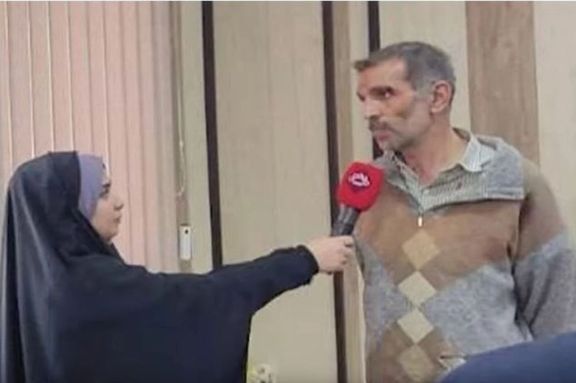
Apparently his wife, who was an Azerbaijani citizen, left him ten months ago and he believed she found refuge inside the mission.
The Islamic Republic’s state broadcaster also talked to the seven-year-old son and 14-year-old daughter of the family, who purportedly were in the car outside the embassy. The girl said she had told her father that their mother was not in the embassy, adding that she was in contact with her mother in Azerbaijan and spoke to her on the phone about 10 days earlier.
Iranian President Ebrahim Raisi called for "a comprehensive investigation" of the incident and sent his condolences to Azerbaijan and the family of the dead man, identified as First Lieutenant Orkhan Rizvan oglu Teymurov. During a phone call with his Azeri counterpart late Saturday, Raisi said Tehran and Baku have inseparable historical relations and will not allow those relations to be affected by the two countries' ill-wishers.
Member of the Iranian parliament’s presidium Ali Nikzad has promised that necessary investigations will be done regarding the attack. The Iranian foreign minister also held a phone call with his Azeri counterpart, calling for the return of the country’s ambassador to Iran.
The incident came amid increased tensions between the neighboring countries triggered by territorial conflict between Azerbaijan and Armenia and Yerevan as well as over Baku's decision this month to appoint its first ever ambassador to Israel. Iran is dangerously implicated in regional tensions centered on Azerbaijan-Armenia that are exacerbated by fall-out from Russia’s war in Ukraine.
In November, at a Baku conference ‘Along the Middle Corridor,’ Azeri President Ilham Aliyev launched a broadside against Iran, his toughest so far since relations soured over Iran’s role in the 2020 Azerbaijan-Armenia war, when adjacent Iranian military exercises followed the Azerbaijanis capturing areas around the disputed Nagorno-Karabagh enclave and along the Iran border. Tehran-Baku tensions have simmered since the 2020 war, when Iran moderated its past support for mainly Christian Armenia due partly to domestic pressures from both ethnic Azeri and Shia clerics supporting fellow Muslims.
“We worked with three presidents of Iran, [Mohammad] Khatami, [Mahmoud] Ahmadinejad, and [Hassan] Rouhani,” Aliyev said. “For all these years there was no situation similar to the current one. Never has Iran had two military exercises near our borders within a few months. There have never been such hateful and threatening statements against Azerbaijan,” he said, referring to warnings from President Ebrahim Raisi and other leaders against any border changes or threats to Iran’s transit route to Armenia, which is vulnerable since 2020 changes. Iran carried out more military drills along the border October, when Foreign Minister Hossein Amir-Abdollahian also visited Yerevan.
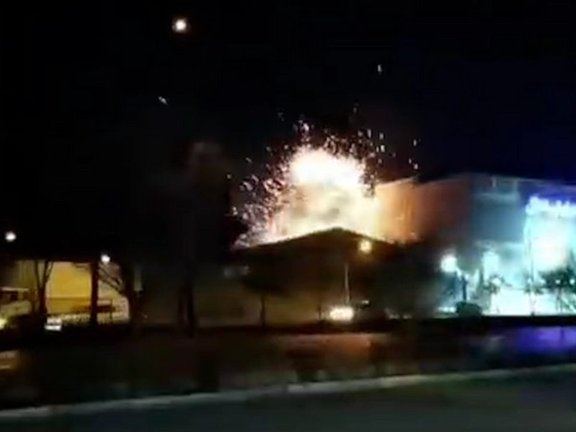
The Israeli weblog Intellitimes says the target of a drone attack Saturday in Esfahan was the "Iranian Space Research Institute" affiliated with the ministry of defense.
While Iranian authorities claim that the drone attack in one of its “munition manufacturing centers” was "unsuccessful", Intellitimes said the targeted site was “the Material and Energy Laboratory of Esfahan.”
The report also added that the timing of the attack was not accidental, and it was carried out on the day the Supreme Leader of the Islamic Republic, Ali Khamenei, visited the exhibition of Iran's industrial accomplishments, including drone achievements.
Two years ago, an attack on one of Iran's centrifuge farms was carried out on the same day President Hassan Rouhani inaugurated the exhibition of Iran's atomic achievements, added the weblog.
The Jerusalem Post, citing Western and foreign intelligence sources, also wrote that contrary to Iran’s claim the attack on "advanced weapons development" facility was a "tremendous success".
Iran’s Foreign Minister Hossein Amir-Abdollahian said Sunday the drone attack will not affect the Islamic Republic's nuclear program.
The Iranian defense ministry reported that “small drones targeted one of the defense ministry centers in Isfahan province, central Iran.” This happened around eleven in the evening Saturday.
“Fortunately, with predictions and defensive measures, the air defense system of the complex managed to detonate two small drones at the top of the complex, while the third caused minor damage to the military complex affiliated with the ministry,” added the report.

The Iranian regime continues to issue harsh sentences, including whipping and long-term imprisonment against journalists, students, teachers, lawyers, and other protesters.
Nazila Maroufian, a journalist, was sentenced to two years in prison, fined 15 million tomans (almost 350 USD) and banned from leaving the country for five years on the charge of "propaganda and publishing lies through an interview with Mahsa Amini's father".
Mahsa Amini, a 22-year-old Kurdish woman was killed in police custody for not having proper hijab in mid-September and her death led to weeks of nationwide protests against the Islamic Republic.
Another journalist, Vida Rabbani was sentenced to 11 years behind bars. Her mother wrote a letter to the chief justice saying that “Vida, now at the age of 33 has to spend 11 years of her young age behind bars arbitrarily upon verdicts issued based on bias.”
On the other hand, US-based Human Rights Activists News Agency (HRANA) reported that Zahra Mehrabi, a student of Tehran University and one of the detainees from nationwide protests, has been sentenced to five years of suspended imprisonment by a revolutionary court.
Amnesty International has also warned that Arshiya Takdastan, an 18-year-old protester who was arrested during the protests north of Iran, has been sentenced to a double death sentence on charges of "war against God" and "corruption on earth".
Amnesty also drew attention to the case of Mehdi Mohammadifar, a 19-year-old protester who has also received a double death sentence.
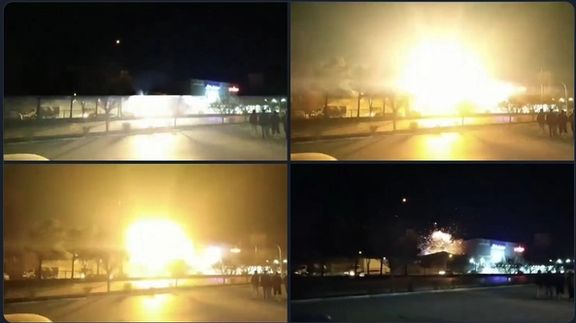
Reports and videos from Iran speak of multiple explosions and a fire at an ammunition factory in the Iranian city of Esfahan shortly after midnight local time.
Following multiple reports by eyewitnesses after midnight, January 29, that an ammunition factory in Esfahan was hit by explosions and fire, Iran's defense ministry announced that small drones attacked the complex, and called the attack “unsuccessful.” It claimed all the drones were shot down, without saying if the attack came from inside the country or from outside.
Small drones have a very short flying time and if these were used against the ammunition factory, they must have been launched from a close distance. That does not necessarily eliminate the possibility of a foreign country being behind the attack, but it would certainly prove some people in Iran carried it out.
"The explosion took place in one of the munitions manufacturing centers of the Defense Ministry and, according to an announcement by the deputy Esfahan governor for security, there were no casualties," IRIB reported.
However, eyewitnesses report and videos show the actual explosions at the factory. Some Twitter users say that the Esfahan factory was manufacturing warheads for the Shahed kamikaze drone that Iran is supplying Russia for attacks in Ukraine.
The official, Mohammad Reza Jannesar, later told state television: "The damages are being investigated as well as the causes and elements that caused this explosion and .. will be announced later."
According to some reports air defenses of Iran's traditional army and the IRGC have been put on high alert.
There were also reports on social media of explosions and smoke in northwest of the capital Tehran. These reports have not been verified.
Also, a large blaze engulfed an industrial area near the city of Tabriz, northwest Iran. The government said the fire started at a refinery producing motor oil, but the cause of the devastating blaze remains unclear.
A social media post by a group of protesters in the southwestern Khuzestan province reports an explosion in Dezful. Another report says there were air raid sirens in Hamedan’s Nozheh airbase, but these remained unverified, similar to reports from Tehran and elesewhere.
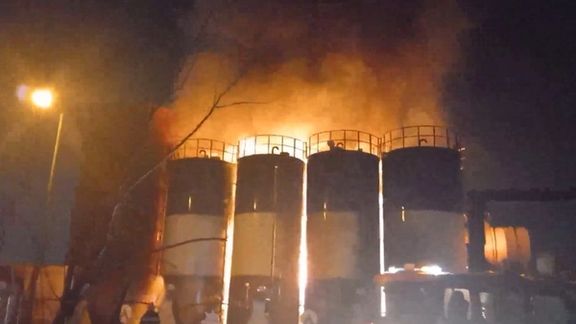
Updated at 08:00 GMT on January 29
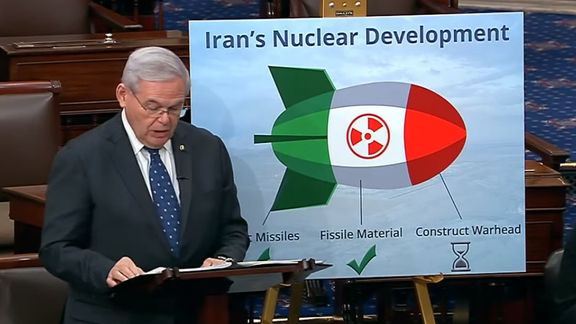
Members of the US Congress are ramping up efforts to pass new legislation in support of Iranian protesters and sanctions on top officials for rights violations.
A bipartisan group of Senate Foreign Relations Committee members and others numbering at least 28 Senators are re-introducing legislation in support of protests in Iran.
In a statement issued January 26, US Senators Bob Menendez (D-NJ), Chairman of the Senate Foreign Relations Committee, Marsha Blackburn (R-Tenn.), Chris Coons (D-Del.), Jim Risch (R-Idaho), Ranking Member of the Senate Foreign Relations Committee, and James Lankford (R-Okla.) announced that the resolution will call on the international community “to continue publicly highlight and condemn the Iranian regime’s crackdown since protests began…”
The resolution also urges the Biden administration “to strengthen international efforts to impose additional sanctions on officials and entities responsible for the violent suppression of demonstrations.”
In more than four months of popular protests, Iranian security forces have killed around 500 people, wounded hundreds and arrested up to 20,000 others. The government also executed four detained protesters in December and many more either face the death penalty or charges that could end in death sentences.
On the same day that Senators issued their statement the House of Representatives overwhelmingly approved a resolution expressing solidarity with Iranian protesters.
The 420-1 rare bipartisan vote marked the latest round of international condemnations against Iran’s government, which has deepened its isolation.
“It is vital that we in the US House of Representatives, a body that is among the greatest symbols of freedom and democracy around the world, stand with one voice to affirm our support for the brave Iranian people,” Rep. Claudia Tenney, R-NY, said during floor debate Wednesday.
The Washington Beacon also reported Friday that according to its sources House Republicans and Democrats are joining forces to sanction Iran’s Supreme Leader Ali Khamenei, who is the commander in chief of the armed forces, and other top regime officials for human rights crimes.
The legislation is dubbed the Mahsa Amini Act after the 22-year-old woman who was fatally wounded in hijab police custody in September and died in hospital. Her death triggered the anti-regime uprising by young people and women.
The Biden administration has imposed a series of sanctions on regime officials and entities since September, but sanctioning Khamenei directly for gross human rights violations will be a strong gesture for the international community and most Iranian who see him as the ultimate decider in the country.
It will also make more negotiation to revive the 2015 nuclear deal (JCPOA) more difficult, as Tehran will likely demand these sanctions to be removed before it agrees to curb its nuclear program.
Indirect talks that the Biden administration initiated in April 2021 have failed to revive the Obama-era agreement and some experts believe a new deal must be negotiated.
Republicans oppose resuming any negotiations with the Islamic Republic amid its killing of protesters and provocative moves, including supplying kamikaze drones to Russia for its war in Ukraine.
The Mahsa Amini Act was introduced in the previous Congress, but Democrats did not support the measure. Now, with Republicans in majority, the Washington Beacon says, “Democratic foreign policy leaders are lending their support to the bill.”